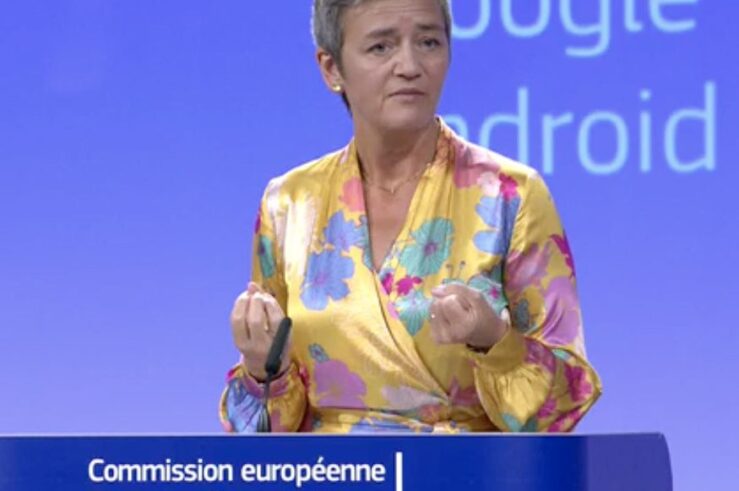Showing archive for: “Tying & Bundling”
Why Don’t People Talk About Breaking Up Microsoft?
[This post is the seventh in an ongoing symposium on “Should We Break Up Big Tech?” that features analysis and opinion from various perspectives.] [This post is authored by Alec Stapp, Research Fellow at the International Center for Law & Economics] Should we break up Microsoft? In all the talk of breaking up “Big Tech,” ... Why Don’t People Talk About Breaking Up Microsoft?
FTC v. Qualcomm: A Case of Regulatory Capture?
There is little doubt that the decision in May 2019 by the Northern District of California in FTC v. Qualcomm is of historical importance. Unless reversed or modified on appeal, the decision would require that the lead innovator behind 3G and 4G smartphone technology renegotiate hundreds of existing licenses with device producers and offer new ... FTC v. Qualcomm: A Case of Regulatory Capture?
The Third Circuit’s Oberdorf v. Amazon opinion offers a good approach to reining in the worst abuses of Section 230
[Note: A group of 50 academics and 27 organizations, including both myself and ICLE, recently released a statement of principles for lawmakers to consider in discussions of Section 230.] In a remarkable ruling issued earlier this month, the Third Circuit Court of Appeals held in Oberdorf v. Amazon that, under Pennsylvania products liability law, Amazon ... The Third Circuit’s Oberdorf v. Amazon opinion offers a good approach to reining in the worst abuses of Section 230
There’s nothing “conservative” about Trump’s views on free speech and the regulation of social media
Yesterday was President Trump’s big “Social Media Summit” where he got together with a number of right-wing firebrands to decry the power of Big Tech to censor conservatives online. According to the Wall Street Journal: Mr. Trump attacked social-media companies he says are trying to silence individuals and groups with right-leaning views, without presenting specific ... There’s nothing “conservative” about Trump’s views on free speech and the regulation of social media
Is Amazon Guilty of Predatory Pricing?
In 2014, Benedict Evans, a venture capitalist at Andreessen Horowitz, wrote “Why Amazon Has No Profits (And Why It Works),” a blog post in which he tried to explain Amazon’s business model. He began with a chart of Amazon’s revenue and net income that has now become (in)famous: Source: Benedict Evans A question inevitably followed ... Is Amazon Guilty of Predatory Pricing?
Elizabeth Warren wants to turn the internet into a literal sewer (service)
Near the end of her new proposal to break up Facebook, Google, Amazon, and Apple, Senator Warren asks, “So what would the Internet look like after all these reforms?” It’s a good question, because, as she herself notes, “Twenty-five years ago, Facebook, Google, and Amazon didn’t exist. Now they are among the most valuable and ... Elizabeth Warren wants to turn the internet into a literal sewer (service)
Doing double damage: The German competition authority’s Facebook decision manages to undermine both antitrust and data protection law
The German Bundeskartellamt's Facebook decision is unsound from either a competition or privacy policy perspective, and will only make the fraught privacy/antitrust relationship worse.
The European Commission’s Google Android decision takes a mistaken, ahistorical view of the smartphone market
What to make of Wednesday’s decision by the European Commission alleging that Google has engaged in anticompetitive behavior? In this post, I contrast the European Commission’s (EC) approach to competition policy with US antitrust, briefly explore the history of smartphones and then discuss the ruling. Asked about the EC’s decision the day it was announced, ... The European Commission’s Google Android decision takes a mistaken, ahistorical view of the smartphone market
Will the European Commission’s Google Android Decision Benefit Consumers?
By Pinar Akman, Professor of Law, University of Leeds* The European Commission’s decision in Google Android cuts a fine line between punishing a company for its success and punishing a company for falling afoul of the rules of the game. Which side of the line it actually falls on cannot be fully understood until the ... Will the European Commission’s Google Android Decision Benefit Consumers?
The EU’s Google Android antitrust decision falls prey to the nirvana fallacy
Today the European Commission launched its latest salvo against Google, issuing a decision in its three-year antitrust investigation into the company’s agreements for distribution of the Android mobile operating system. The massive fine levied by the Commission will dominate the headlines, but the underlying legal theory and proposed remedies are just as notable — and ... The EU’s Google Android antitrust decision falls prey to the nirvana fallacy
Why the Commission’s Google Android decision harms competition and stifles innovation
Our story begins on the morning of January 9, 2007. Few people knew it at the time, but the world of wireless communications was about to change forever. Steve Jobs walked on stage wearing his usual turtleneck, and proceeded to reveal the iPhone. The rest, as they say, is history. The iPhone moved the wireless ... Why the Commission’s Google Android decision harms competition and stifles innovation
Will the European Commission Reduce the Incentive to Innovate?
The EC’s Android decision is expected sometime in the next couple of weeks. Current speculation is that the EC may issue a fine exceeding last year’s huge 2.4B EU fine for Google’s alleged antitrust violations related to the display of general search results. Based on the statement of objections (“SO”), I expect the Android decision ... Will the European Commission Reduce the Incentive to Innovate?







